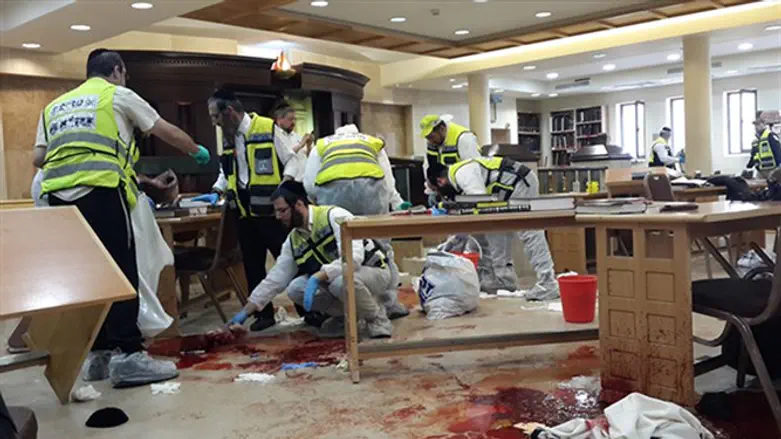
Four years ago, a deadly terror attack took place at the Kehilat Bnei Torah synagogue and Kollel (Torah learning center) in the Har Nof neighborhood in Jerusalem. Five worshippers and one police officer were killed by two terrorists - and the incident shook the nation and the entire world.
Arutz Sheva visited the scene of the attack this week to learn firsthand how the world of Torah learning has strengthened and expanded in the four years after the massacre.
Elimelech Berman, studies daily at the Kollel and was a member of the Kollel at the time of the incident as well. "At the 6:30 prayer service, two terrorists came in in the middle of the prayers", Berman recalls, "they started slaughtering the people that were praying inside."
Inside the synagogue we meet Yitzi Levine, the bereaved son of Rabbi Kalman Levine, who was murdered in the attack.
"They came with knives and one gun", explains Levine, "they were shooting and killing people... chopping them down."
"My father was after his own prayers, he came to the synagogue to do something. He was outside of the hall so they hit him first, and that gave people a chance to run out."
Levine emphasizes the fact that the murderous attack took place in a synagogue: "It's not a war zone, not even a place of politics, it's a sanctuary. It feels very strange to attack a location like this, it feels very hateful and very antisemitic. It reminds us older and darker times of attacks against Jews because they're Jews."
After the massacre, the Kollel decided to expand in memory of the victims.The main program that was strengthened was the night Kollel - a unique program that invites working men to sit down and learn Torah in the Kollel every evening.
This is the true revenge, explains Elimelech Berman: "A person feels is that he wants a revenge. We took this to a place where revenge wasn't about going to kill out the people who tried to hurt us. What we did was strengthen our Torah studies and our prayers, trying to brings ourselves to a higher level - and that's the revenge that a Jew needs to take."
As a bereaved son, Yitzi Levine sees a special significance and meaning to the Torah study in memory of the victims.
"A person doesn't exist just in this life", he explains, "as long as something I did here continues, essentially I am really still alive. What they did here (in the Kollel) is keeping these people alive with us by bringing more Torah, and this Torah is connected to them."
"It gives a lot of comfort," Levine says, "because on some level I believe he (my father) is still alive. If he was alive he would want to learn Torah and gain more Torah and Mitzvot. As a son, I feel more obligated... I wasn't so religious when the terror attack happened, but today I am one-hundred-percent religious, sitting and learning over here."
In wake of the Pittsburgh massacre, we ask unfortunately experienced terror-stricken Israelis for their advice - how do you rise above the tragedy?
"That's what you have to do", says Berman, "you have to get up and continue, that's what's life about in any way. When we have signs from G-d that we have to strengthen and make ourselves better, we use it as a tool o bring ourselves to a higher level."
The activity of the Kollel is supported by many donors from around the world. Levine expresses his personal gratitude to those who keep his father alive. "It's not only to commemorate", he emphasizes, "rather actually giving them (the victims) some sort of living. So keep on going and contribute as much as you could. Because for me as a son I want to keep him alive obviously, as much as I could."